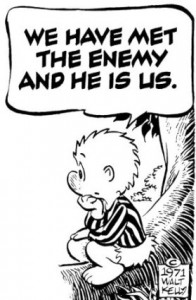I ran into an interesting paragraph at Family Security Matters. I’ve run across their site a couple of times and don’t find their views particularly useful, but I was intrigued by this article by Frank Hill, in which he suggested that we should stop blaming others for so many of our troubles.
Here’s the paragraph — it’s worth analyzing because of the power inside these two simple sentences:
The drug crisis would disappear if we and our children stopped using cocaine and marijuana for recreational purposes. Drug pushers don’t force it down our throats; we willingly buy it and use it and talk about it as if it was something to be proud of.
Let’s start with the second sentence: “Drug pushers don’t force it down our throats; we willingly buy it and use it…” Very true. And this is an area where we constantly face blatantly absurd statements. The liberals will talk about the dangerous drugs that poison people, while the conservatives bemoan the evil drug dealers that poison people, but, in fact, the incidents of people being drugged against their will are rare indeed.
Most people who receive drugs seek them out willingly, even eagerly, and voluntarily offer to pay money for them. And, most of them do so with full knowledge of the risks involved (to the extent that they don’t, that’s another bad side-effect of prohibition).
It’s nice to see this point acknowledged, and it’s important that we make it clear to people.
Back to the first sentence: “The drug crisis would disappear if we and our children stopped using cocaine and marijuana for recreational purposes.” Also true. If everyone voluntarily stopped using currently illicit drugs, the problems related to those drugs and the prohibition of those drugs would go away pretty much overnight. Absolutely true. And absolutely irrelevant, because it’s an absolute impossibility.
This is like saying “If everyone stopped having sex, we could eliminate STDs, abortions, and unwanted pregnancies.” True, but absurd — not even worthy of a science fiction short story.
You can take responsibility for yourself, and say “I’m not going to take these drugs,” and you can attempt to encourage those around you to follow your lead, but you have no power to force the rest of the world to suddenly move into your fantasy world where nobody wants to do drugs, and all the hot people want to sleep with you.
 In the article, Frank Hill invokes Pogo’s famous cartoon line “Yep, son, we have met the enemy and he is us.†And it’s true, but not in the way Hill envisions. Yes, people choose to do drugs, but that’s not us-as-enemy, that’s freedom. And yes, we could end drug problems by stopping all drug use, but that’s also not us-as-enemy, that’s fantasy.
In the article, Frank Hill invokes Pogo’s famous cartoon line “Yep, son, we have met the enemy and he is us.†And it’s true, but not in the way Hill envisions. Yes, people choose to do drugs, but that’s not us-as-enemy, that’s freedom. And yes, we could end drug problems by stopping all drug use, but that’s also not us-as-enemy, that’s fantasy.
The enemy that is us… is prohibition. It is the war that we fight against our own people, our own children, with our own money. It is the politician afraid to follow the truth, the neighbor seduced by the propaganda, the cop and prosecutor caught up in the heat of the battle. It’s the academic who just wants to find a better way to make prohibition work, the scientist who goes for the gold and the publicity, rather than the science. It’s the political party member who says this just isn’t the time for reform.
The enemy is us, indeed.

 In the article, Frank Hill invokes Pogo’s famous cartoon line “Yep, son, we have met the enemy and he is us.†And it’s true, but not in the way Hill envisions. Yes, people choose to do drugs, but that’s not us-as-enemy, that’s freedom. And yes, we could end drug problems by stopping all drug use, but that’s also not us-as-enemy, that’s fantasy.
In the article, Frank Hill invokes Pogo’s famous cartoon line “Yep, son, we have met the enemy and he is us.†And it’s true, but not in the way Hill envisions. Yes, people choose to do drugs, but that’s not us-as-enemy, that’s freedom. And yes, we could end drug problems by stopping all drug use, but that’s also not us-as-enemy, that’s fantasy. 